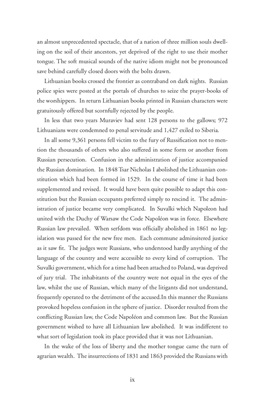
ix
an almost unprecedented spectacle, that of a nation of three million souls dwelling on
the soil of their ancestors, yet deprived of the right to use their mother
tongue. The soft musical sounds of the native idiom might not be pronounced
save behind carefully closed doors with the bolts drawn.
Lithuanian books crossed the frontier as contraband on dark nights. Russian
police spies were posted at the portals of churches to seize the prayer-books of
the worshippers. In return Lithuanian books printed in Russian characters were
gratuitously offered but scornfully rejected by the people.
In less that two years Muraviev had sent 128 persons to the gallows; 972
Lithuanians were condemned to penal servitude and 1,427 exiled to Siberia.
In all some 9,361 persons fell victim to the fury of Russification not to mention the
thousands of others who also suffered in some form or another from
Russian persecution. Confusion in the administration of justice accompanied
the Russian domination. In 1848 Tsar Nicholas I abolished the Lithuanian constitution which
had been formed in 1529. In the course of time it had been
supplemented and revised. It would have been quite possible to adapt this constitution but
the Russian occupants preferred simply to rescind it. The administration of
justice became very complicated. In Suvalki which Napoleon had
united with the Duchy of Warsaw the Code Napoléon was in force. Elsewhere
Russian law prevailed. When serfdom was officially abolished in 1861 no legislation was
passed for the new free men. Each commune adminsitered justice
as it saw fit. The judges were Russians, who understood hardly anything of the
language of the country and were accessible to every kind of corruption. The
Suvalki government, which for a time had been attached to Poland, was deprived
of jury trial. The inhabitants of the country were not equal in the eyes of the
law, whilst the use of Russian, which many of the litigants did not understand,
frequently operated to the detriment of the accused.In this manner the Russians
provoked hopeless confusion in the sphere of justice. Disorder resulted from the
conflicting Russian law, the Code Napoléon and common law. But the Russian
government wished to have all Lithuanian law abolished. It was indifferent to
what sort of legislation took its place provided that it was not Lithuanian.
In the wake of the loss of liberty and the mother tongue came the turn of
agrarian wealth. The insurrections of 1831 and 1863 provided the Russians with